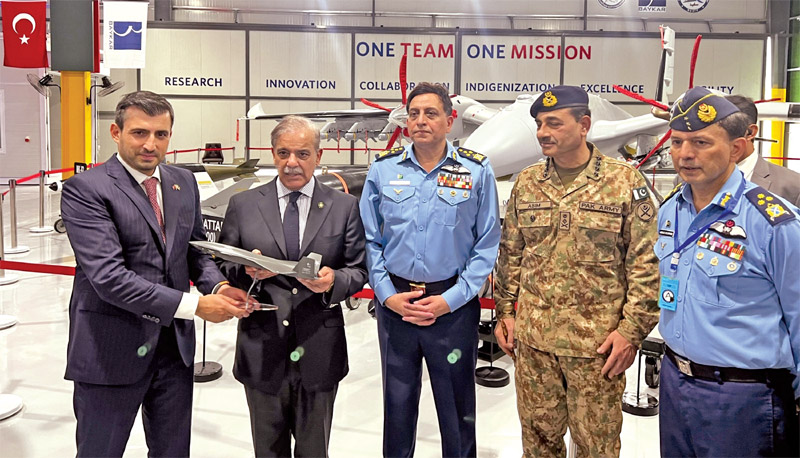Turkey joins the list of suppliers of new-generation weapon systems to India’s neighbour
Prasun K Sengupta
Despite being in a state of economic meltdown for the past three years, Pakistan continues to rely on full-scale imports of new-generation weapon systems and their components, with Turkey now joining the list of suppliers that had earlier included China and South Africa. This trend was evidenced by the range of exhibits displayed at IDEF ’23, the 16th International Defence Industry Fair held between July 25 and 28 at Istanbul, where Pakistan’s state-owned Global Industrial & Defence Solutions (GIDS) exhibited several of its new products.

In October 2018, the state-owned Aviation Industry Corporation of China (AVIC) and the Kamra-based Pakistan Aeronautical Complex (PAC) had agreed to co-produce 48 CAIG CH-4B Wing Loong-II medium-altitude long-endurance unnamed aerial vehicles (MALE-UAV) for both the Pakistan army and the Pakistan Air Force (PAF). The PAF had by then been operating four fully-imported CH-4A Wing Loong-Is (an earlier variant). The first confirmed sighting of this in Pakistan occurred in 2016, when a CH-4A crashed in the vicinity of Mianwali air base.
The Pakistan army’s aviation corps had then opted to procure the CH-4B variant from the China Aerospace Science & Technology Corp (CASC), with the first batch of five CH-4Bs arriving in Pakistan in early 2021. Later the same year, both the army and the PAF decided to forego the procurement of additional CH-4Bs in favour of procuring from Turkey the Bayraktar Akinci MALE-UAVs, the first of which were delivered to Islamabad on March 8 this year by a PAF Ilyushin IL-78MP transport aircraft with tail number R11-003, which took off from Tekirdağ Çorlu Atatürk Airport, where Baykar Defence’s test and production facilities are located.
Along with the Akinci MALE-UAVs, Baykar will supply its 20 km-range Kemankes loitering munition that comes powered by a turbojet engine developed by Kale Arge. Since 2011 this company has developed three types of turbojets. The KTJ-1750 has a four-stage axial compressor design capable of producing 1,750 Newtons of thrust at sea level and operating at speeds of up to Mach 0.95. The KTJ-1750 has a diameter of 202mm, weighs 25kg, has a specific fuel consumption value of 0.12KG/H/N and a thrust/ weight ratio of 1:11, and a length of 464mm. The KTJ-3200 turbojet, comprising a four-stage axial compressor, annular combustion chamber and a single-stage turbine, with a thrust power of 3,200 Newtons, is 63cm in length, approximately 30cm in diameter, and weighs 50kg. The compressor stages of the ITAR-free engine are made of aluminium and the combustion chamber and the turbine is made of Nickel-based superalloys. Since the compressor uses monolithic (one-piece) rotors, the engine has low fuel consumption and high thermal efficiency.
The KTJ-3200 has been designed to operate at an altitude of 5,000 metres and deliver a top speed of Mach 0.95. The KTJ-3700 turbojet, which weighs 50kg, is aimed to have an operating altitude of 10,000 meters and a flight speed of Mach 0.95. The subsonic Taimur air-launched land-attack cruise missile/ anti-ship cruise missile showcased by GIDS at IDEF ’23 will be powered by a more powerful variant of the KTJ-3700. The 1,100kg Taimur is expected to have a range of 300 km, maximum launch altitude of 25,000 feet and cruise altitude between 2,000 feet and 20,000 feet.
Naval Contracts
The first Turkish company to bag a significant export order from Pakistan was Savunma Teknolojileri Mühendislik ve Ticaret AŞ (STM), when it was contracted for the Pakistan Navy’s Fleet Tanker Project (PNFT) on 22 January 2013. That contract included the design and construction of a fleet tanker and for providing the ship design package and the material package, including materials, devices and systems to be used in shipbuilding, and building the vessel at the state-owned Karachi Shipbuilding & Engineering Works (KSEW) yard. The vessel has a weight of 15,600 tonnes, length of approximately 155 metres and a maximum speed of 20 knots. The vessel was launched on 19 August 2016, and it performed its first cruise on the Indian Ocean on 31 March 2018. It took the name PNS Moawin on 16 October 2018 upon its commissioning.
The second major export success came in July 2018 when the contract for procuring four Babur-class guided-missile corvettes for the Pakistan navy was signed between Pakistan’s ministry of defence production and Turkey’s Military Factory & Shipyard Management Corp (ASFAT). Under this project, the first two corvettes are under construction at the Istanbul Naval Shipyard while the latter two are being constructed at KSEW under licence, Karachi. Kuasar Marine, a Turkish engineering firm, was in charge of the corvette’s design. The programme commenced on 11 March 2019 and deliveries of the warships will be made at six-month intervals. Each corvette will displace 2,926 tonnes, have a length of 108.2 metres, beamwidth of 14.8 metres, draught of 4.05 metres, maximum speed of 31 Knots, range of 3,500 nautical miles endurance of 15 days at sea, and a crew complement of 93 + 40. The propulsion package for all the corvettes comprises one General Electric LM-2500 gas turbine in a combined diesel and gas turbine configuration with two diesel engines, with the total propulsion power being 31,600 kilowatts.
You must be logged in to view this content.

